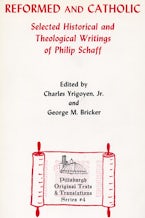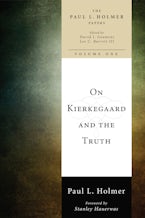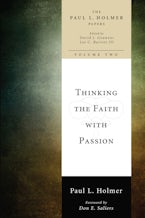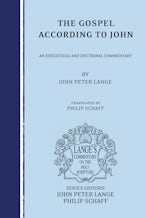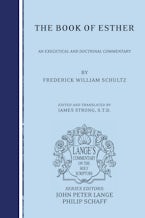- Home
- Mercersburg Theology Study Series
- religion
- The Early Creeds
The Early Creeds
The Mercersburg Theologians Appropriate the Creedal Heritage
by John Williamson Nevin, Philip Schaff and John Williams Proudfit
Edited by Charles Yrigoyen Jr. and Lee C. Barrett
Series: Mercersburg Theology Study Series
Imprint: Wipf and Stock
Authors:
John Williamson Nevin (1803–1886) was an innovative and controversial American theologian. Although reared in Presbyterianism, Nevin became the premier exponent of the “Mercersburg Theology” of the German Reformed Church. He promoted a view of Christianity as evolving, focused on the Incarnation, and centered in the sacraments.
Philip Schaff (1819–1893) was a German emigré who taught theology and church history at Mercersburg Seminary and Union Theological Seminary, New York. In the United States he pioneered the study of the history of Christianity and was a progenitor of the ecumenical movement.
John Williams Proudfit (1803–1870) was a classicist and ecclesial historian who taught at New York University and New Brunswick Seminary. His more bibiliocentric Reformed theology motivated him to passionately and caustically critique Nevin’s work.
Editors:
Charles Yrigoyen Jr., a prominent pastor, teacher, and scholar, has written numerous books and articles on the history of Methodism and on the Mercersburg Theology. He has coedited two volumes of the highlights of the Mercersburg Theology: Catholic and Reformed: Selected Theological Writings of John Williamson Nevin, and Reformed and Catholic: Selected Theological Writings of Philip Schaff.
Lee C. Barrett is a professor of theology at Lancaster Theological Seminary. He has authored several books and articles interpreting the writings of Søren Kierkegaard and is a coeditor of the Mercersburg Theology Study Series.
“In these writings, John Williamson Nevin and Philip Schaff develop their conviction that the foundation of the catholic and ecumenical Christian tradition is to be found in the Apostles’ Creed, which expresses the transforming presence of the triune God in the continuing incarnation of the Son of God in the church. The editors do an exemplary job of placing these texts in their theological and cultural contexts. These writings are essential for an understanding of Mercersburg theology.”
—Randall C. Zachman, Professor Emeritus of Reformation Studies, University of Notre Dame
“Nevin’s and Schaff’s articles championing the early creeds provide a fascinating window into the entire range of their ‘catholic and Reformed’ theology. Best of all, their spirited debates with then-dominant American ‘Puritan’ ‘anti-creed’ Protestant views anticipate, as the editors rightly note, continuing issues in contemporary American constructive theology. Brilliantly edited, with immensely helpful historical footnotes, this volume is a gift for anyone concerned with recovering the centrality of the early creeds for Christian confession.”
—David J. Gouwens, Professor Emeritus of Theology, Brite Divinity School
“In this important volume, Professors Yrigoyen and Barrett carefully introduce and annotate key writings by Nevin and Schaff. The Apostles’ Creed emerges here as the hermeneutical lens through which the Mercersburg theologians read Scripture—anchored in an understanding of incarnation as the crucial work of Christ (in contrast to prevailing theories of atonement) and shaped by social practices and communal language (instead of immediate experience). Contemporary religious debates will be enhanced through engagement with these writings.”
—Theodore Louis Trost, Professor of Religious Studies, University of Alabama
“Church debates are worth revisiting only if something crucial is at stake. Nevin and Schaff used a debate regarding the creeds to affirm that Christianity is about the incarnation and new life in Christ and the Spirit, in contrast to thinking that we believe as solitary individuals cut off from the community of Christ, sacraments, and tradition. That makes the book worth reading. The introductions are an added bonus.”
—Peter Schmiechen, Professor of Theology and President Emeritus, Lancaster Seminary
“This most welcome addition to The Mercersburg Theology Study Series brings together for a twenty-first-century audience seminal and incisive documents from the Mercersburg efforts to appropriate the great creedal heritage of the church for their own nineteenth-century context. Lucidly and carefully edited by Charles Yrigoyen and Lee Barrett, the volume also serves as a fitting capstone to Yrigoyen’s many significant contributions to Mercersburg studies. It will be of interest to those concerned with the perennial questions of religious authority, theological hermeneutics, and the relationship of the individual and the corporate in Christianity.”
—William B. Evans, Younts Professor of Bible and Religion, Erskine College, and author of A Companion to the Mercersburg Theology


